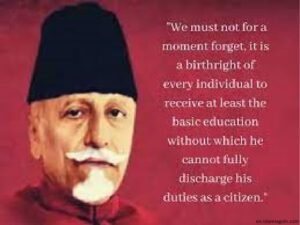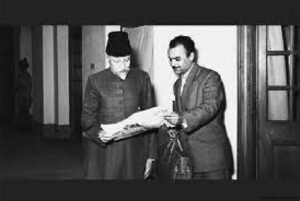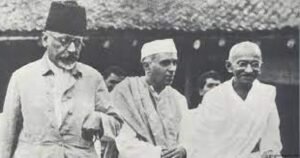Today we will discuss FAITH IS UNIFYING: THAT WAS AZAD’S MESSAGE

FAITH IS UNIFYING: THAT WAS AZAD’S MESSAGE
Mohiuddin Ahmad, better known as Abul Kalam Azad (1888- 1958), was a prominent and distinguished leader of India’s freedom movement and the first Education Minister of free India. He was born on 11 November 1888 in Mecca in a family that had migrated from India after 1857 They shifted back to Calcutta in 1890. His political sagacity, patriotic fervour and intellectual prowess were recognised early and he was made Congress President in 1923 at a comparatively young age of 35, a position he held for a number of years on different crucial occasions.
Right from 1905 when he joined the revolutionary groups of Bengal, it was clear that he believed in conducting politics on the basis of common nationality and not exclusive community.
At a time when the term qaum (nation) was still in use to describe religious communities and castes, Maulana Azad used the term for common Indian nationality. In his presidential address to the Khilafat Conference in 1921. Maulana Azad said, ‘It is the religious duty of the Muslims of India to join the Hindus in sincerity and goodwill to form one nation.”

Maulana Azad believed that common Indian nationality was not the outcome of some conscious human effort, rather it was fashioned by providence over a period of one thousand years. He said in 1923:
These thousand years of our joint life have moulded us into a common nationality. This cannot be done artificially. Nature does her fashioning through her hidden processes in the course of centuries. The cast has now been moulded and destiny has her seal upon it. Whether we like it or not, we now have become an Indian nation, united and indivisible.
Many a political analyst commented that although Maulana Azad was a devout Muslim he worked relentlessly for Hindu-Muslim unity and communal harmony. Such remarks give the impression that Maulana Azad was trying to reconcile two incompatibles.
A reading of his commentary of the Holy Quran (Tarjumanul Quran), however, shows that his views on common nationality spring from his belief in the principle of unity of religion and unity of mankind. He rejects the notion that religion promotes exclusive doctrines and erects walls of separation between communities. He believed that:
Truth is one and the same everywhere, but it has different dresses. Our misfortune is that the world worships terms and not their meaning. Thus, though all may worship the same truth, they will quarrel on account of differences of terms.

The Quran, according to him, differentiates between religion and its outward observance.
The former is called deen and the latter is shariat (law) Deen (religion) was but one and the same everywhere and at all times and vouchsafed to one and all without discrimination. In respect of shanat (outward observance), there was variation and it was inevitable: Variation of this nature could not alter the character of deen or the basis of religion.
Maulana Azad describes this essence as ‘unity in truth’ (mushtarak haq) the spiritual content that is found in all religions. In practical terms it means devotion to God and righteous living.
He holds that religion seeks to build a mind that reflects the beauty and mercy of God and universal humanity. He said. The primary aim of religion was to keep mankind united. But the great tragedy of man was that he turned an instrument of unity into a weapon of disunity.” We will truly honour his memory if we revive religion as a unifying force.

1 thought on “FAITH IS UNIFYING: THAT WAS AZAD’S MESSAGE”